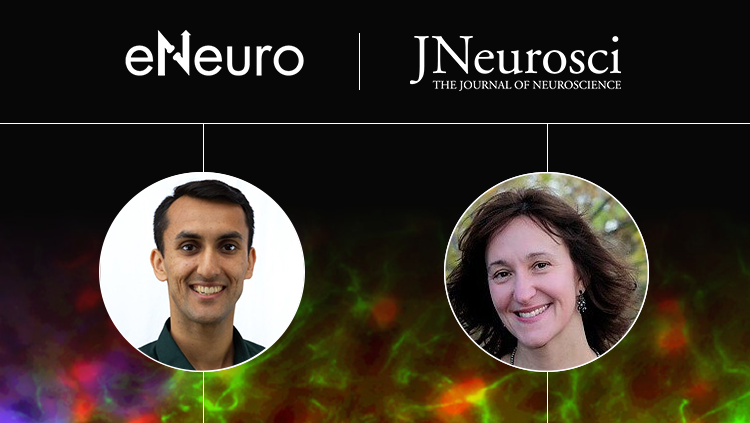 Access a searchable transcript of this video by clicking the magnifying glass icon in the player.
Access a searchable transcript of this video by clicking the magnifying glass icon in the player.
Join this interactive session as Anthony Burgos-Robles and Ada Felix-Ortiz discuss their paper, “Prefrontal Regulation of Safety Learning during Ethologically Relevant Thermal Threat”, with eNeuro Editor-in-Chief Christophe Bernard. Attendees can submit questions at registration and live during the webinar.
Below is the significance statement of the paper published on January 25, 2024 in eNeuro and authored by Ada C. Felix-Ortiz, Jaelyn M. Terrell, Carolina Gonzalez, Hope D. Msengi, Miranda B. Boggan, Angelica R. Ramos, Gabrielle Magalhães, and Anthony Burgos-Robles
This study provides new insights on the role of prefrontal cortical processing for threat and safety learning during thermal challenge. For this, a novel behavioral paradigm was implemented in which laboratory mice learned that a particular spatial zone was associated with either a noxious cold temperature (“thermal threat”) or a pleasant warm temperature (“thermal safety”). Manipulations of neuronal activity revealed that the prelimbic and infralimbic subregions of the medial prefrontal cortex bidirectionally regulated memory formation for the thermal safety zone, but not for the thermal threat zone. In addition, the influence of these cortical regions during safety memory formation was altered when mice underwent a stress treatment to produce a disease-like state.
Registration is now open for all upcoming webinars. The webinars are complimentary for SfN members and $15 for nonmembers. Activate your account to receive member access to webinars.
Speakers

Ada Felix-Ortiz, MS
Ada Felix-Ortiz has dedicated her professional career in neuroscience to dissect the neural mechanisms contributing to anxiety-related behavior and mental disease. She completed a bachelor’s degree in psychology at the University of Puerto Rico, and a master's degree in behavioral neuroscience at the Northeastern University in Massachusetts. Her master's dissertation focused on understanding the neural underpinnings of autism spectrum disorder (ASD), using a rodent model and various techniques to assess alterations in brain function, such as fMRI. After her master’s, she continued research activities as a laboratory technician at the Massachusetts Institute of Technology (MIT) under the guidance of Kay Tye. Her work at MIT revealed key amygdala pathways to the ventral hippocampus (vHPC) and the medial prefrontal cortex (mPFC) that contributed to the profound modulation of anxiety-like and social-related behaviors. After several peer-reviewed articles, she moved to a startup company in the biotechnology sector to lead research projects on a mouse model of Friedreich Ataxia, as well as on evaluations of gene expression in animal models of Parkinson's and Alzheimer's Disease. After a few years, she went back to academia to continue research efforts on the neural mechanisms involved in behavioral regulation. She joined the laboratory of Anthony Burgos-Robles at UTSA as Lab Manager and Senior Research Associate to lead projects that are center around the neurobiology of threat learning, adaptive behavior, and the impact of social isolation stress.

Anthony Burgos-Robles, PhD
After a bachelor’s degree in chemistry at his home island of Puerto Rico (Pontifical Catholic University), Anthony Burgos-Robles joined a doctoral program in biomedical sciences (Ponce School of Medicine – Mentor, Gregory Quirk) to launch a career in behavioral neuroscience focused on the study of the neural mechanisms underlying fear learning, stress, and emotional trauma. Burgos-Robles then expanded his knowledge and research skills as a postdoctoral fellow at the Massachusetts Institute of Technology (Mentors, Kay Tye and Ki Goosens), before joining the department of Neuroscience, Developmental, and Regenerative Biology (NDRB) at the University of Texas at San Antonio (UTSA) as a tenure-track faculty. As principal investigator, Burgos-Robles’ research program has been focusing on the neural substrates contributing to multiple forms of adaptive defensive behavior during various types of threat. His lab has developed novel paradigms in behaving mice to evaluate the following: [1] Adaptive behavior during situations involving naturalistic thermal threat and safety (e.g., when particular spatial zones are associated with either a noxious or a pleasant temperature); [2] Adaptive behavior during situations requiring the flexible adaptation of active avoidance responses during signaled threat (e.g., animals need to alternate certain behavioral actions such as climbing on distinct platforms to escape shock punishment); and [3] Adaptive behavior when social situations lead to threat and punishment (e.g., social preference turns into enduring social avoidance when interactions with an unfamiliar conspecific result in emotional trauma). So far, these novel paradigms have produced fascinating results while changing the perspective of Burgos-Robles and his research team on how neural circuits around the medial prefrontal cortex (mPFC) regulate threat learning and coordinate adaptive behavior. In addition to behavioral paradigms, Burgos-Robles is implementing strategies such as in vivo neuronal recordings, optogenetics, chemogenetics to dissociate the role of distinct subregions of mPFC, and to dissect the functional role of key inputs and outputs of the mPFC to provide better mechanistic explanations for the processes involved during distinct types of threat. Finally, while implementing models of prolonged stress, he aims to enhance knowledge about psychiatric disorders that are characterized by profound alterations in prefrontal function and behavioral adaption.
Christophe Bernard, PhD
Christophe Bernard, PhD, is the PhysioNet team leader in at the Institute of Neuroscience Systems at the French Institute of Health and Medical Research (INSERM). His research focuses on understanding how physiological and pathological behaviors emerge from the organization and reorganization of the underlying neuronal architecture, with an emphasis on epilepsy. He currently serves as editor-in-chief of eNeuro.
Who can attend these webinars? All webinars in this series are complimentary to SfN members. Join or renew for access. This webinar is $15 for nonmembers.
Will the webinars be available on-demand? Yes, all webinars will be available to watch on demand after the live broadcast.
How do I access the conference on the live day? After registering, you will receive a confirmation email with the event link and the option to download calendar reminders.
What are the technology requirements for attending? These webinars are hosted on Zoom Webinar. Instructions for joining and participating in a webinar can be found here.
Can I ask the presenters questions? Yes! You can submit any questions before the webinar through the registration form. During the webinar, you can submit questions through the Q&A box.
Will a certificate of attendance be offered for this event? No, SfN does not provide certificates of attendance for webinars.
I have other questions not answered here. Email digitallearning@sfn.org with any other questions.
Review SfN’s Code of Conduct, rules for virtual events in the Digital Learning Community Guidelines, and communications policies regarding dissemination of unpublished scientific data, listed below. SfN asks that conference attendees respect the sensitivity of information and data being presented that are not yet available to the public by following these guidelines:
- Do not capture or publicly share details of any unpublished data presented.
- If you are unsure whether data is unpublished, check with the presenter.
- Respect presenters' wishes if they indicate that the information presented is not to be shared.
Webinar Refund Policy
What is the cancellation/refund policy for webinars?
- If SfN changes fundamental details of the webinar (date, time, or speakers), nonmember registrants may request a registration refund.
- To request a refund, please email digitallearning@sfn.org at least 48 hours before the event. Otherwise, refunds are not provided. All webinars are complimentary to SfN members.
- SfN webinars can be watched on-demand if someone is unable to attend the live broadcast.

![]() Access a searchable transcript of this video by clicking the magnifying glass icon in the player.
Access a searchable transcript of this video by clicking the magnifying glass icon in the player.












